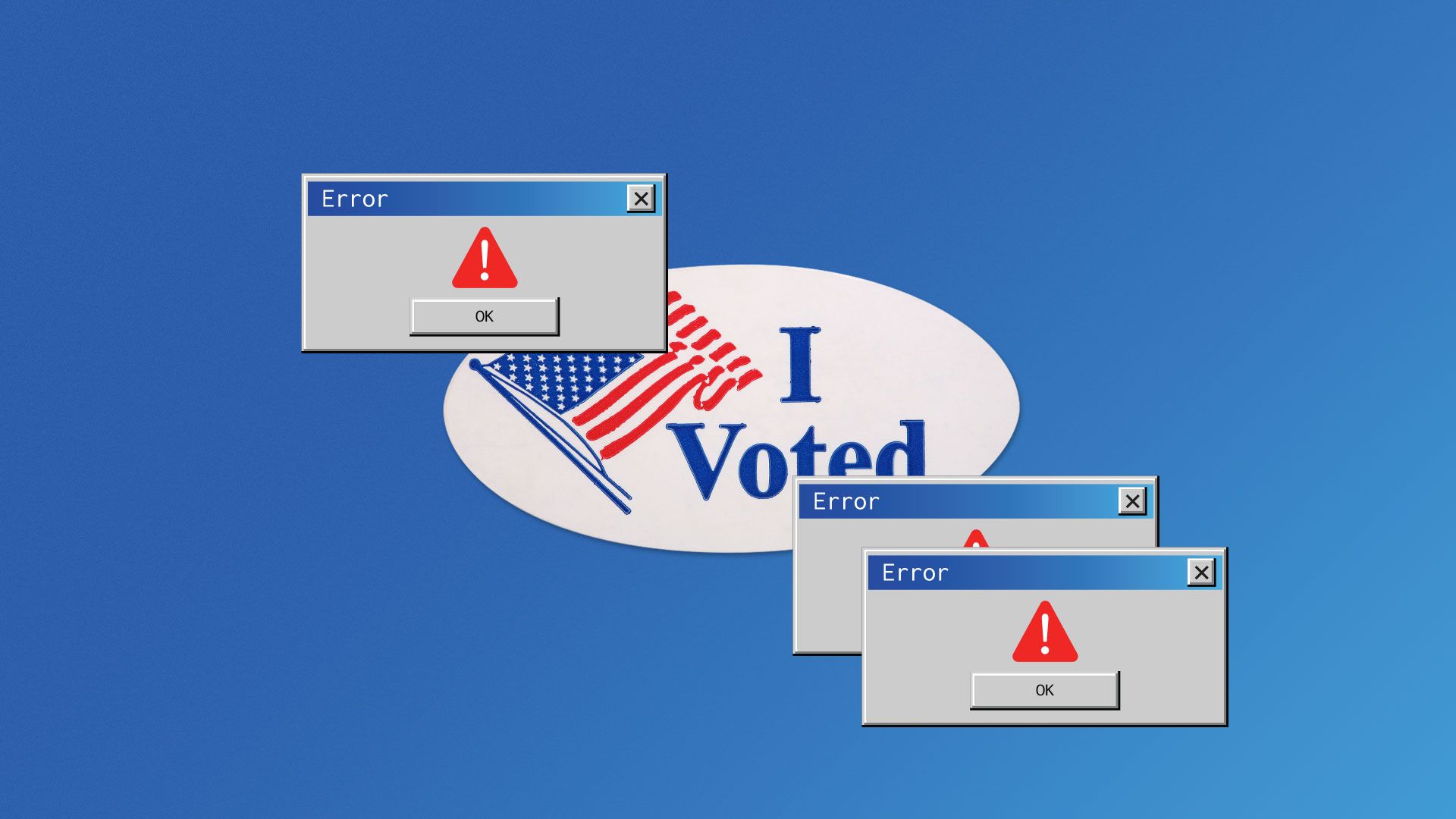Why we're still not voting online, even in a pandemic
Add Axios as your preferred source to
see more of our stories on Google.

Illustration: Eniola Odetunde/Axios
Nearly every aspect of daily life has moved online as a result of the coronavirus pandemic, but voting via the internet is still largely a non-starter.
The big picture: Officials grappling with making elections compatible with social distancing are focusing on tried-and-true methods like mail-in ballots rather than online voting platforms, which have a limited track record and raise major election security concerns.
Details: Before the pandemic, states including Utah, Washington and Oregon had been experimenting with online voting on a limited basis.
- West Virginia let overseas residents and troops vote via mobile devices in the 2018 federal election, and is expanding that option to people with physical disabilities for its June primary.
- However, West Virginia Secretary of State Mac Warner told Axios he doesn't envision the pandemic moving the state to expand mobile voting further. Instead, West Virginia has mailed absentee ballot applications for the primary to all registered voters.
Between the lines: The technology just isn't there yet to build a wide-scale online voting system that supports both a secret ballot and auditable elections, said Dan Guido, co-founder and CEO of cybersecurity firm Trail of Bits.
- Guido's team uncovered problems with Voatz, a mobile voting platform that's been used in West Virginia and other states. (West Virginia plans to use a different provider — Democracy Live — for June’s primary, and Voatz says it’s working to fix the issues that Trail of Bits found.)
- More broadly, Guido said online voting is still in its "infancy."
- "It's not something where we're going to hackathon our way to a solution," he told Axios. "The kinds of technical advances required are something that require smart people to make progress over inches over time."
What they're saying: Voatz and Democracy Live agree that it's not time yet for online voting at scale. But, as the pandemic drags on, they're drawing more interest from states in trialling their tech on a targeted basis.
- "We disagree if somebody is saying that we are not ready for pilots and we're not ready for maybe one state," said Voatz chief of staff Hilary Braseth. "We think that this is the time to do that. And especially in the landscape of a pandemic, it would be a disservice to our critical infrastructure to not be testing."
- Democracy Live President Bryan Finney said his firm doesn't offer fully online voting, as it generates a paper copy to be printed by voters or vote counters.
- Tusk Philanthropies, which funds mobile voting pilot programs, expects at least three jurisdictions to announce they're expanding online voting for some voters this month, president Sheila Nix said.
- "We've got to be trying to do everything we can to make it easier for people to vote, and the pandemic situation just shows the urgency of getting it done right," said Nix, who noted that people already use their phones for banking, boarding planes and other high-security transactions.
Yes, but: States are already facing budget crunches and can't spend big on cybersecurity, as banks do — all while still accepting a risk of fraud that states likewise can't afford.
- "It is OK for 1% of all [the banks'] transactions to be mistakes. It is not OK for 1% of all your votes to be mistakes," Guido said.
Where it stands: Federal lawmakers concerned about the coronavirus are looking to conventional alternatives to flooding the polling places on Election Day.
- Sens. Amy Klobuchar and Ron Wyden last month led legislation to expand early in-person voting and allow for no-excuse vote-by-mail nationwide in response to the pandemic. The bill, however, has no GOP backers.
- "“I’m not aware of any online voting system that has been proven secure and reliable by independent cybersecurity experts," Wyden said in a statement. "It’s not worth risking our democracy on unproven, insecure technology.”
- Nevertheless, West Virginia's Warner said he'd like to see Congress dedicate funding to developing online voting — first for military voters, and then possibly for greater use.
- "There's a gold standard of voting in person that I will always support," Warner said. "But mobile voting should be developed to the point where it becomes an option at certain times and for certain constituencies."
